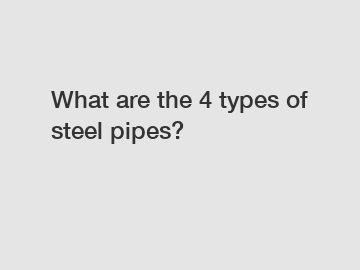What are the 4 types of steel pipes?
Steel pipes are a crucial component in various industries such as construction, oil and gas, automotive, and manufacturing. They are essential for transporting fluids and gases, providing structural support, and serving as conduits for electrical wiring. When it comes to steel pipes, there are four main types that are commonly used: seamless, welded, galvanized, and LSAW pipes. Each type has its own unique characteristics, advantages, and applications.
Seamless Steel Pipes:
Seamless steel pipes are made from solid round steel billets that are heated and pierced to create a hollow tube. These pipes do not have any seams or joints, making them ideal for high-pressure applications and environments where leakage could be a concern. Seamless steel pipes are known for their uniformity and strength, which makes them suitable for use in critical industries such as oil and gas exploration, power generation, and chemical processing.

One of the main advantages of seamless steel pipes is their ability to withstand high pressure and temperatures. Since they do not have any welded seams, they are less likely to leak or burst under extreme conditions. Seamless pipes are also easier to install and require minimal maintenance, making them a cost-effective and reliable choice for many industries.
Welded Steel Pipes:
Welded steel pipes are made by bending and shaping steel plates or coils into a cylindrical shape and then welding the seams together. These pipes are commonly used in construction projects, water distribution systems, and structural applications where strength and durability are important. Welded steel pipes are available in various sizes and thicknesses to meet the specific requirements of each project.
One of the benefits of welded steel pipes is their cost-effectiveness. Since they can be made from steel plates or coils, they are typically less expensive than seamless pipes. Welded pipes are also easier to customize and can be manufactured in a variety of lengths and diameters to fit the needs of each project. However, welded pipes may not be as strong or durable as seamless pipes, especially in high-pressure or high-temperature applications.
Galvanized Steel Pipes:
Galvanized steel pipes are coated with a layer of zinc to protect them from corrosion and rust. This coating helps to extend the lifespan of the pipes and makes them resistant to harsh environmental conditions. Galvanized steel pipes are commonly used in outdoor applications such as fencing, water supply lines, and drainage systems where exposure to moisture and weathering is a concern.
The main advantage of galvanized steel pipes is their superior corrosion resistance. The zinc coating acts as a barrier between the steel and the environment, preventing rust and deterioration. Galvanized pipes are also easy to install and require minimal maintenance, making them a cost-effective solution for many outdoor projects. However, galvanized pipes may not be suitable for high-temperature applications, as the zinc coating can melt or degrade at extreme temperatures.
LSAW (Longitudinal Submerged Arc Welded) Steel Pipes:
LSAW steel pipes are made by bending and shaping steel plates into a cylindrical shape and then welding the seams using a submerged arc welding process. These pipes are commonly used in pipelines for transporting oil, gas, and other fluids over long distances. LSAW pipes are known for their high strength, reliability, and resistance to corrosion, making them ideal for demanding applications in the energy and petrochemical industries.
One of the key advantages of LSAW steel pipes is their ability to withstand high pressures and temperatures. The submerged arc welding process creates strong, durable welds that can handle extreme conditions without leaking or bursting. LSAW pipes are also available in large diameters and thicknesses, making them suitable for long-distance pipelines that require high flow rates and efficiency.
In conclusion, steel pipes play a vital role in various industries and applications, and it is essential to choose the right type of pipe for each project. Whether you need seamless pipes for high-pressure environments, welded pipes for cost-effective solutions, galvanized pipes for outdoor applications, or LSAW pipes for long-distance pipelines, each type has its own unique characteristics and benefits. By understanding the differences between these four types of steel pipes, you can make an informed decision that meets the specific requirements of your project and ensures long-lasting performance and reliability.
If you are looking for more details, kindly visit PVC Water Supply Pipe for Rainwater system, hdpe steel bellows, PVC Drainage Pipe for Fisheries.

Comments
0